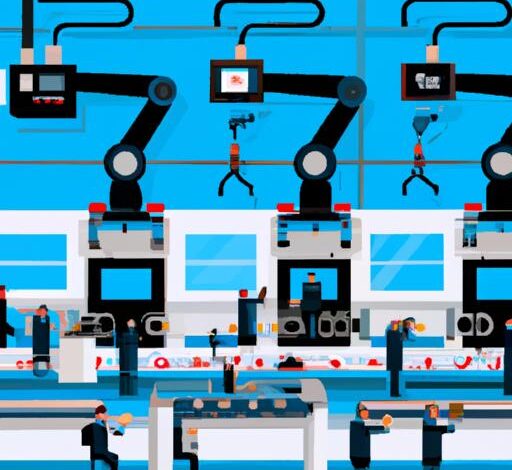Data Analytics for Manufacturing: Revolutionizing Efficiency and Productivity

Data analytics has become a cornerstone in the manufacturing industry, propelling organizations towards heightened efficiency and productivity levels. In today’s fast-paced world, the ability to harness and analyze data is crucial for staying ahead of the competition. Imagine having the power to predict maintenance issues before they occur or optimize production processes to minimize waste – this is the transformative impact of data analytics in manufacturing.
The importance of data analytics in the manufacturing sector cannot be overstated. By leveraging data-driven insights, companies can make informed decisions, streamline operations, and enhance overall performance. From predictive maintenance to supply chain optimization, data analytics opens up a realm of possibilities for manufacturers looking to gain a competitive edge in the market. Let’s delve deeper into the realm of data analytics for manufacturing and explore the myriad benefits it offers to businesses in this dynamic industry.
Understanding Data Analytics
Definition of Data Analytics for Manufacturing
Data analytics in manufacturing involves the process of analyzing and interpreting data to uncover valuable insights that drive operational improvements. By utilizing advanced analytical techniques, manufacturers can extract actionable intelligence from vast amounts of data generated throughout the production cycle.
Types of Data Analytics Used in Manufacturing
In the realm of manufacturing, various types of data analytics techniques are employed to extract meaningful information and optimize processes. Descriptive analytics provides a retrospective view of past performance, while diagnostic analytics helps identify the root causes of issues. Predictive analytics, on the other hand, enables manufacturers to forecast outcomes and prevent potential problems before they arise. Lastly, prescriptive analytics offers recommendations on the best course of action based on the insights gathered from data analysis.
Benefits of Implementing Data Analytics in Manufacturing Processes
The implementation of data analytics in manufacturing processes brings forth a myriad of benefits. Enhanced decision-making capabilities, improved operational efficiency, reduced downtime, and optimized resource utilization are just a few advantages that manufacturers can reap from harnessing the power of data analytics. By leveraging data-driven insights, organizations can drive innovation, boost productivity, and ultimately achieve sustainable growth in a competitive market landscape.
Challenges in Implementing Data Analytics in Manufacturing
Lack of Skilled Workforce
One of the primary challenges faced by manufacturers when implementing data analytics is the shortage of skilled professionals adept at handling data analytics tools and technologies. The complexity of data analytics requires specialized knowledge and expertise, making it essential for companies to invest in training programs to upskill their workforce. Without a proficient team to interpret and analyze data effectively, the full potential of data analytics may remain untapped.
Integration of Data from Different Sources
Manufacturing processes generate vast amounts of data from various sources such as IoT devices, sensors, and production systems. Integrating this disparate data into a cohesive and unified platform poses a significant challenge for manufacturers. Ensuring seamless data flow and compatibility between different systems is essential for deriving actionable insights from the data. Companies must invest in robust data integration solutions to overcome this hurdle and harness the full power of data analytics in manufacturing.
Security and Privacy Concerns
With the increasing digitization of manufacturing processes, data security and privacy have emerged as critical concerns for companies implementing data analytics. Safeguarding sensitive data from cyber threats and ensuring compliance with data protection regulations are paramount. Establishing robust data security protocols, encryption measures, and access controls is crucial to protect confidential information and build trust with customers and stakeholders. Manufacturers must prioritize data security as an integral part of their data analytics strategy to mitigate risks and uphold the integrity of their operations.
Best Practices for Implementing Data Analytics in Manufacturing
Investing in the Right Tools and Technology
In the realm of data analytics for manufacturing, having the right tools and technology at your disposal can make all the difference. Investing in advanced analytics software, IoT sensors, and data visualization tools can empower organizations to collect, analyze, and interpret data effectively. By leveraging cutting-edge technology, manufacturers can gain valuable insights into their operations, identify trends, and make data-driven decisions that drive success.
Training Employees on Data Analytics
One of the key pillars of successful data analytics implementation in manufacturing is ensuring that your workforce is equipped with the necessary skills and knowledge. Providing comprehensive training programs on data analytics tools and techniques can empower employees to leverage data effectively in their day-to-day tasks. By fostering a culture of data literacy within the organization, manufacturers can enhance decision-making processes, drive innovation, and improve overall operational efficiency.
Establishing Clear Goals and Metrics for Data Analytics Initiatives
To maximize the impact of data analytics in manufacturing, it is essential to establish clear goals and metrics for your analytics initiatives. By defining key performance indicators (KPIs) and setting specific objectives, organizations can track progress, measure success, and optimize their data analytics strategies. Whether the goal is to improve production efficiency, reduce downtime, or enhance product quality, having a well-defined roadmap helps align data analytics efforts with business objectives and drive tangible results.
Case Studies of Successful Data Analytics Implementation in Manufacturing
Example 1: Company A Increasing Production Efficiency through Data Analytics
In the competitive landscape of manufacturing, Company A stood out as a beacon of success by harnessing the power of data analytics. By implementing advanced data analytics tools and technologies, Company A was able to optimize its production processes, leading to a significant increase in efficiency. Through real-time monitoring and data-driven insights, the company identified bottlenecks in its operations and swiftly addressed them, resulting in streamlined workflows and enhanced productivity. This successful integration of data analytics not only improved operational efficiency but also positioned Company A as a leader in the manufacturing industry.
Example 2: Company B Reducing Equipment Downtime with Predictive Maintenance
Equipment downtime can be a costly affair for manufacturers, impacting production schedules and profitability. Recognizing the importance of proactive maintenance, Company B embraced predictive analytics to mitigate the risks associated with unplanned downtime. By analyzing historical data and implementing predictive maintenance algorithms, Company B could anticipate potential equipment failures and take preemptive measures to prevent them. This proactive approach not only reduced downtime but also extended the lifespan of machinery, resulting in cost savings and increased operational efficiency. The successful deployment of predictive maintenance through data analytics underscores the transformative impact of leveraging data-driven insights in manufacturing processes.
Conclusion
In conclusion, data analytics for manufacturing is not just a trend but a necessity in today’s competitive landscape. By harnessing the power of data, manufacturers can unlock valuable insights that drive operational excellence, cost savings, and innovation. From optimizing production processes to enabling predictive maintenance, data analytics offers a myriad of opportunities for manufacturers to enhance efficiency and productivity.
As we look towards the future, the integration of advanced technologies like predictive analytics and machine learning will further revolutionize the manufacturing industry. Embracing these innovations and investing in data analytics capabilities will be key to staying ahead of the curve and thriving in an increasingly data-driven world. So, take the leap into the world of data analytics for manufacturing and unleash the full potential of your operations. The time to transform your business with data is now.
Conclusion: So above is the Data Analytics for Manufacturing: Revolutionizing Efficiency and Productivity article. Hopefully with this article you can help you in life, always follow and read our good articles on the website: data.ouachitaadventures.com

